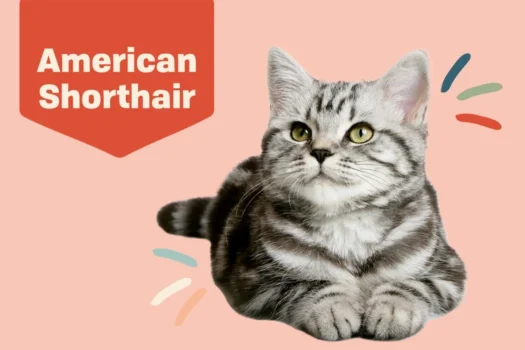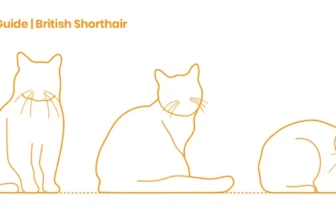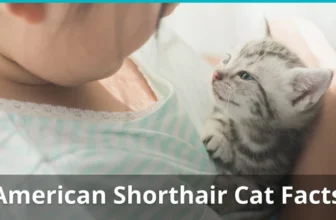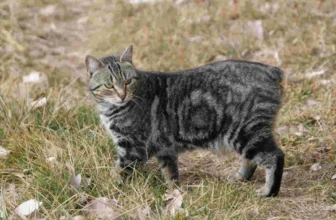As feline lovers, we all want our American Shorthair cats to live long, healthy lives full of purrs and cuddles. However, the life expectancy of our furry friends can be influenced by a number of factors. From genetics and diet to environmental factors and mental health, there are many elements that come into play when it comes to the longevity of our beloved pets. In this article, we will delve into the various factors affecting the life expectancy of American Shorthair cats, as well as provide tips and advice for keeping them healthy and happy throughout their lives. So sit back, grab a cup of coffee and let’s delve into the fascinating world of feline health!
Genetics
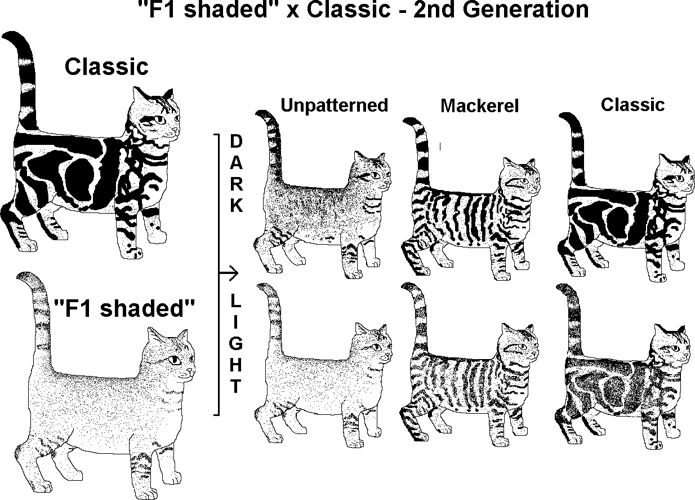
When it comes to the life expectancy of American Shorthair cats, genetics play a crucial role. Just like humans, cats inherit certain traits and predispositions from their parents. Understanding the genetic makeup of these cats can provide some insight into the factors that affect their lifespan. According to experts, American Shorthair cats can live up to 20 years, but several genetic factors can impact their longevity. Let’s take a closer look at some of these factors.
Hereditary Diseases
It is known that genetics plays a major role in the life expectancy of American Shorthair cats. Hereditary diseases can significantly impact the health and longevity of your furry friend. In fact, certain health conditions may be passed down from generation to generation among the American Shorthair breed. It is essential to know about the most common hereditary diseases that affect American Shorthair cats to prepare for any potential health issues that may arise.
Polygonosisspondyloarthropathy (PSA) is a genetic condition that affects the spine and joints. It can cause stiffness, inflammation, and pain, affecting your cat’s mobility and comfort levels. Symptoms of PSA include limping, difficulty jumping, and back pain. While there is no definitive cure, your veterinarian can help manage symptoms through medication and a diet primarily focusing on anti-inflammatory foods.
Hypertrophic cardiomyopathy (HCM) is a genetic heart disease that can lead to heart failure. It affects the muscular walls of the heart, making it harder for the heart to pump blood effectively. This condition can cause severe symptoms such as fainting, lethargy, and shortness of breath. If HCM is diagnosed early, a proper diet and medication plan can help to manage the symptoms.
Polycystic kidney disease (PKD) is an inherited condition that affects the kidneys. It can lead to increased kidney size and the formation of cysts, causing renal failure and potential death. Early symptoms of PKD may include frequent urination, vomiting, and weight loss. In many cases, a special diet, medication, and regular check-ups can help manage the disease.
It is important to note that these hereditary diseases can be prevented through regular health check-ups, proper nutrition, and exercise. Proper care, forethought, and medical monitoring can significantly extend the life expectancy of your American Shorthair cat.
For more information on common health issues that affect American Shorthair cats, check out our article “Health Problems and Life Expectancy of American Shorthair Cats”. Additionally, if you are interested in comparing the life expectancy of American Shorthair cats to other popular cat breeds, visit our article on “Cat Life Expectancy Comparison”. And for tips on nutrition that can help reduce the risk of hereditary diseases in your American Shorthair cat, check out our article on “Nutrition Tips for American Shorthair Cats”.
Predisposition to Certain Conditions
American Shorthair cats, like any other breed, may have a predisposition to certain conditions due to their genetics. It’s essential to be aware of these conditions so that you can watch for signs and take preventative measures where necessary.
Below is a table that highlights some of the most common predispositions and their impact on a cat’s life expectancy.
| Condition | Effect on Life Expectancy |
|---|---|
| Feline Hypertrophic Cardiomyopathy (HCM) | May significantly reduce life expectancy as it can lead to heart failure and sudden death. |
| Polycystic Kidney Disease (PKD) | May shorten life expectancy due to the risk of kidney failure. |
| Diabetes | If left untreated, diabetes can cause complications such as nerve damage, blindness, and kidney disease. Proper management can increase life expectancy. |
| Asthma | Untreated asthma can lead to chronic bronchitis, respiratory failure, and even death. With proper care, a cat with asthma can lead a normal life expectancy. |
| Hyperthyroidism | Untreated hyperthyroidism can cause heart problems, high blood pressure, and other complications that can shorten life expectancy. With proper treatment, a cat can lead a normal life. |
It’s important to note that not all American Shorthair cats will develop these conditions, and some may lead long and healthy lives without any major health concerns. Still, it’s essential to monitor your cat’s health and take them for regular check-ups with a veterinarian to catch any potential issues early on. With adequate care, you can help your furry friend live a long and happy life.
Diet and Exercise
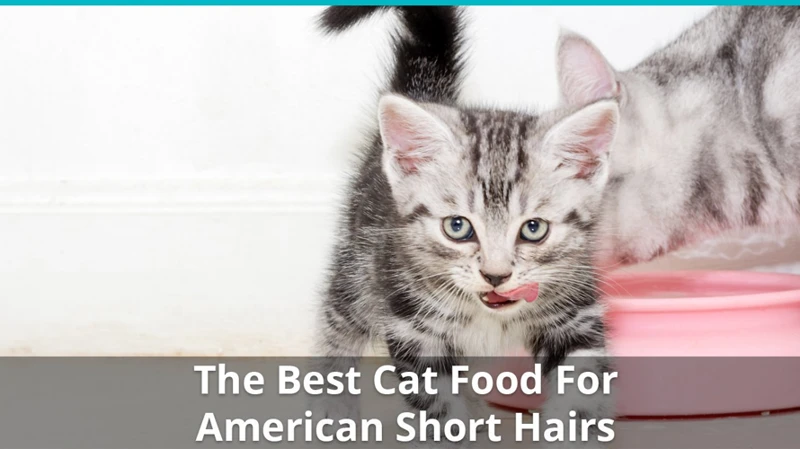
When it comes to the life expectancy of American Shorthair cats, their diet and exercise play a crucial role. Their eating habits and physical activity level influence their overall health and well-being. As a cat owner, it is essential to provide your pet with a balanced diet and opportunities for exercise to keep them healthy and lively. In this section, we will discuss in detail how proper diet and exercise can impact your cat’s longevity and quality of life.
Importance of a Balanced Diet
Providing a balanced diet is crucial to ensuring the long and healthy life of an American Shorthair cat. A balanced diet consists of appropriate amounts of fat, protein, vitamins, and minerals. The following table highlights the critical role each of these nutrients plays in the well-being of your feline companion:
| Nutrient | Role |
|---|---|
| Protein | Essential for building and repairing tissues and maintaining a healthy immune system |
| Fat | Provides a source of energy, helps with nutrient absorption, and aids in maintaining healthy skin and fur |
| Vitamins | Necessary for overall health, including eye, bone, and muscle development, and proper functioning of the immune system |
| Minerals | Essential for strong bone growth, and regulating many key bodily functions such as enzyme activity, fluid balance, and oxygen transport |
It’s essential to provide your American Shorthair cat with quality sources of these nutrients. Feeding them a balanced diet, consisting of high-quality protein, moderate amounts of fat, and appropriate vitamin and mineral sources, will help them maintain a healthy weight, strong immune system, and maintain overall health. Keep in mind that overfeeding or feeding a low-quality diet can lead to obesity, which can cause numerous health problems for your cat in the long run.
Consulting with a veterinarian can help you determine the best food options for your American Shorthair cat, and whether any additional supplements may be necessary. Proper nutrition and balanced diet are essential components of ensuring the long and healthy life of your furry friend.
Exercise Requirements
American Shorthair cats are generally known for their active nature and playful personalities. However, just like any other cat breed, they need regular exercise to maintain their physical and mental health. The amount of exercise required can vary based on age, weight, and overall health condition. Here are some exercise requirements that need to be taken into consideration:
- Daily Playtime: All cats, including American Shorthairs, need daily playtime to stay healthy and happy. Engage your cat in interactive play sessions with toys like laser pointers, feather wands, and balls. A minimum of 20-30 minutes of playtime is recommended each day.
- Encourage Movement: Encourage your feline friend to move around the house by placing toys in various areas, high perches, and scratching posts. This will increase their physical activity and prevent them from leading a sedentary lifestyle.
- Outdoor Time: American Shorthairs love spending time outdoors, exploring and playing. If you have a safe outdoor space, consider letting your cat spend some time in the fresh air, but ensure you supervise them at all times and provide appropriate shelter, water, and food.
- Active Toys: You can encourage exercise with the right toys. Toys that roll, bounce, and jingle will keep your pet active and engaged. Puzzle feeders and treat balls are also great options to provide mental stimulation and increase physical activity by stimulating hunting instincts.
It should be noted that exercise alone is not enough for your cat’s health. A balanced diet, regular veterinarian checkups, and mental stimulation are all critical to their overall wellbeing. By keeping your American Shorthair active and engaged, you can help them maintain optimal health and happiness for years to come.
Environmental Factors
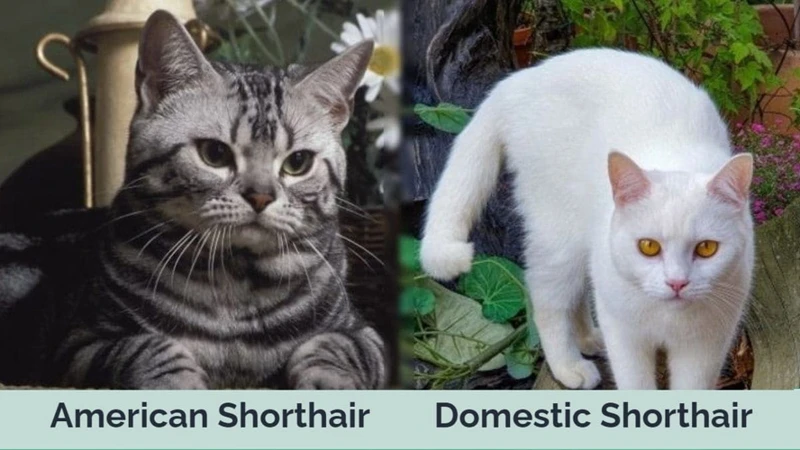
As much as genetics and diet play a crucial role in determining the lifespan of American Shorthair Cats, environmental factors also play a pivotal role. The surroundings that a cat lives in can contribute significantly to their physical and mental well-being. From living conditions to toxins exposure, it is essential to create a safe environment that promotes a healthy and long life for American Shorthair Cats. Let’s explore some of the environmental factors that affect the lifespan of these furry felines.
Living Conditions
The living conditions of American Shorthair cats can affect their life expectancy. Providing a safe and comfortable environment for your cat is essential for its health and wellbeing. Below are some factors to consider when creating a living space for your American Shorthair cat:
| Factor | Description |
|---|---|
| Space | Provide enough space for your cat to move around comfortably. Cats love to climb and jump, so make sure to provide a cat tree or shelf to satisfy its natural instincts. |
| Temperature | American Shorthair cats can tolerate a wide range of temperature, but it’s best to keep their living space comfortable, around 68-72°F. |
| Noise level | Cats are sensitive to noise. Loud noises or consistent sound can affect their quality of life. Keep their living space peaceful and quiet. |
| Lighting | American Shorthair cats need natural light to maintain healthy sleep patterns. Provide plenty of natural light or a daylight bulb in their living space. |
| Cleanliness | Keeping your cat’s living space clean is crucial for their health. Regular cleaning of their litter box and living area can prevent the spread of diseases and reduce stress. |
| Safety | Ensure that your cat’s living space is safe. Keep toxic plants, chemicals, and small objects out of reach. Screens or windows should be secure to prevent falls. |
By considering these factors and creating a safe and comfortable living space for your American Shorthair cat, you can increase its life expectancy and overall quality of life. Remember to regularly assess and adjust your cat’s environment to meet its changing needs.
Avoiding Toxins
It’s important to take steps to avoid exposing American Shorthair cats to harmful toxins as they can lead to serious health issues and even lower their life expectancy. Here are some common toxins to watch out for:
- Household cleaners: Some common household cleaners contain harmful chemicals like ammonia and bleach, which can be toxic to cats if ingested or inhaled. It’s best to use pet-friendly cleaners or natural alternatives, like vinegar and baking soda.
- Human medications: Many human medications, particularly painkillers and antidepressants, can be highly toxic to cats even in small amounts. Always keep any medication out of reach of curious paws.
- Plants: There are many houseplants that are toxic to cats, including lilies, azaleas, and poinsettias. Be sure to research any plant before bringing it into your home, and keep toxic plants out of your cat’s reach.
- Pesticides: Pesticides are commonly used both inside and outside the home to control insects and rodents, but many can be toxic to cats if ingested. Try using natural pest control methods instead, like diatomaceous earth or essential oils.
- Foods: There are many human foods that are toxic to cats, including chocolate, onions, and garlic. Be careful not to give your cat any human food without first checking if it’s safe for them to eat.
By taking these steps, you can help keep your American Shorthair cat safe from harmful toxins and improve their overall health and wellbeing. If you suspect that your cat has ingested something toxic or is experiencing any concerning symptoms, be sure to contact your veterinarian immediately.
Common Health Issues
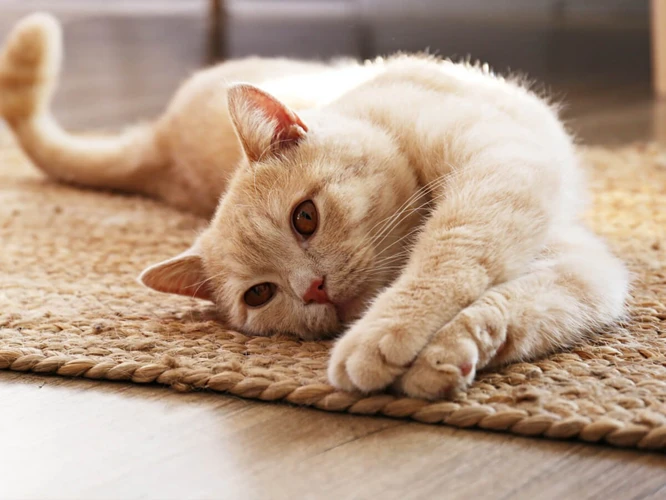
As much as we wish our feline friends could live forever, unfortunately, they are not immune to health issues. In fact, American Shorthair cats can be prone to a variety of common health issues that affect their overall well-being. It’s important for cat owners to be aware of these issues to ensure their pets live long and healthy lives. In this section, we will discuss some of the most prevalent health problems that American Shorthair cats may face and provide tips for prevention and treatment.
Prevention and Treatment of Obesity
It’s no secret that many American Shorthair cats struggle with obesity. Unfortunately, carrying around extra weight can put a lot of strain on your cat’s body and shorten their life expectancy. That’s why it’s important to take steps to prevent or treat obesity in your furry friend. Here are some ways to do so:
- Proper Diet: Feeding your cat a balanced diet that is appropriate for their age and activity level is the first step in preventing obesity. Avoid overfeeding your cat and stick to a consistent feeding schedule.
- Avoid Free Feeding: Leaving a bowl of food out all day is never a good idea for any cat, especially one prone to gaining weight. Measure out meals ahead of time and feed your cat at set times throughout the day.
- Encourage Exercise: Exercise is important for maintaining a healthy weight in cats. Encourage your American Shorthair to play and engage in activities that get their body moving. Experiment with different types of toys that your cat enjoys, such as laser pointers, feather wands, or catnip mice. You can also try taking your cat for a walk on a harness and leash.
- Consult with a Vet: If you suspect that your cat is already overweight, take them to the vet for a check-up. The vet can recommend a diet and exercise plan that is tailored to your cat’s needs. In some cases, they may also recommend medication to help your cat lose weight or prevent weight gain.
- Monitor Your Cat’s Progress: Keep track of your cat’s weight and body condition score regularly. This will help you determine if your cat is on track to reaching their ideal weight or if adjustments need to be made to their diet or exercise routine.
By following these tips and maintaining a healthy weight for your American Shorthair, you can help ensure a longer, happier life for your furry friend.
Dental Health
Dental health is one of the most crucial factors affecting the life expectancy of American shorthair cats. Dental problems can lead to discomfort, pain, and even serious infections that can affect the entire body of your pet. Here are some important points to keep in mind in order to maintain your cat’s dental health:
- Regular Brushing: Just like humans, cats need regular dental cleaning to avoid buildup of plaque and tartar. Cat owners should brush their cat’s teeth at least a few times a week to ensure that their teeth stay clean and healthy. Special toothpaste and toothbrushes are available for cats, which can make dental cleaning an easy and stress-free task.
- Dental Treats: Treats that are designed to promote dental health can be beneficial for your cat’s teeth. These treats are formulated to help break up any plaque that may be forming on your cat’s teeth. However, it is important not to rely solely on these treats for your cat’s dental health, as they do not replace regular brushing or professional cleaning.
- Regular Check-ups: Regular dental check-ups with your veterinarian can help catch dental problems before they become serious. During these check-ups, the veterinarian will examine your cat’s teeth and gums to make sure that they are healthy. If any problems are detected, the veterinarian can recommend appropriate treatment to prevent the problem from worsening.
- Proper Diet: Diet can also play a role in maintaining your cat’s dental health. Feeding your cat a dry food diet can help to scrape away plaque and tartar as they chew, promoting healthy teeth. Additionally, feeding your cat a well-balanced diet that is rich in nutrients can help to strengthen their teeth and gums.
By following these simple tips, you can help to ensure that your American shorthair cat maintains good dental hygiene. Remember that prevention is key when it comes to dental health. Regular dental cleaning, professional check-ups, and a well-balanced diet can go a long way toward ensuring your cat’s teeth stay healthy and strong for years to come.
Mental Health
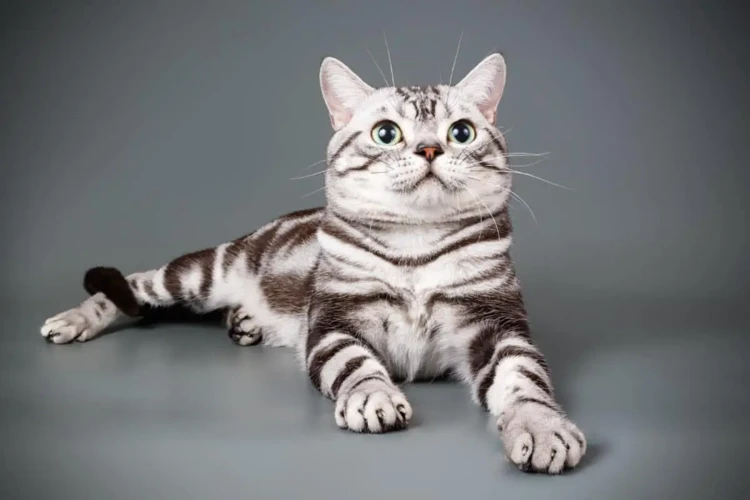
Our feline companions require more than just physical care, their mental health is just as important. Ensuring a cat’s mental well-being is crucial to their overall quality of life. Cats are intelligent animals that require stimulation and mental enrichment to keep them happy and healthy. In this section, we’ll explore different ways to promote your American Shorthair cat’s mental wellness, including enrichment activities and methods for reducing stress.
Enrichment Activities
Enrichment activities help to keep American Shorthair cats mentally stimulated and engaged. These activities can be simple and easy to implement, such as providing a scratching post or puzzle feeder, or more complex, like creating an obstacle course for your cat to navigate.
Playtime is one of the best enrichment activities for American Shorthair cats. Cats are natural hunters and need to engage in activities that satisfy their hunting instincts. You can use cat toys, such as feather wands or laser pointers, to stimulate your cat’s natural predatory instincts. Rotate the toys to keep the playtime fresh and exciting for your cat.
Creating a safe outdoor space can also provide enrichment for your American Shorthair cat. However, it is important to ensure that the outdoor space is secure and free from hazards, such as toxic plants or other predators. An enclosed outdoor cat run or catio can provide your cat with fresh air, sunshine, and mental stimulation.
Puzzles and food dispensers can be used to make mealtime more engaging for your American Shorthair cat. Puzzle feeders can be purchased or easily made at home using everyday objects, such as cardboard boxes or toilet paper rolls. Food dispensers, like treat balls, can be filled with your cat’s favorite treats or kibble and provide a fun challenge for your cat to work out how to retrieve the food.
Training and tricks can also be a great way to provide enrichment for American Shorthair cats. Teaching your cat basic tricks, such as sit, stay, and come, can help to create a stronger bond between you and your cat. Training your cat can also help to build your cat’s confidence and provide mental stimulation.
By providing a variety of enrichment activities for your American Shorthair cat, you can help to improve your cat’s mental and physical health. Regular playtime, exposure to the outdoors, puzzles and food dispensers, and training and tricks are all ways to keep your cat stimulated and engaged.
Reducing Stress
Stress has a significant impact on the life expectancy of American Shorthair cats. Chronic stress can lead to several health issues, such as obesity, heart disease, and anxiety disorders. It is essential for cat owners to take proactive measures to minimize stress in their pets. Here are some ways to reduce stress in American Shorthair cats:
| Method | Description |
|---|---|
| Provide Ambient Sounds | Playing soft music or keeping the television on when the cat is alone can provide ambient sounds that may help reduce anxiety in cats. Noise canceling technology on your headphones can also be helpful to isolate the cat from disturbing street noise. |
| Use Pheromone Sprays or Diffusers | Pheromone sprays and diffusers release calming scents that can help alleviate anxiety and stress in cats. These products are available at most pet stores and can be useful for cats with separation anxiety or fear of loud noises. |
| Encourage Regular Playtime and Exercise | Regular exercise and playtime sessions can reduce stress and anxiety in cats. Providing toys that stimulate their natural hunting instincts can help your cat expend energy and reduce anxiety. |
| Create Safe and Comfortable Spaces | American Shorthair cats require a safe and comfortable environment. Having a designated space in your home for your cat, such as a cozy bed or a spot on the window sill, provides a sense of security and can help reduce stress. |
| Avoid Abrupt Changes | Cats do not like change. Abrupt changes in your cat’s environment, such as moving to a new home or changing their food suddenly, can be stressful for them. Introduce changes gradually, over days or weeks, to minimize stress in your cat. |
| Provide Love and Affection | American Shorthair cats respond positively to love and affection from their owners. Regular grooming and cuddling sessions can reduce stress and anxiety in cats. |
By taking proactive measures to reduce stress in American Shorthair cats, cat owners can help to prolong their pet’s life expectancy and improve their overall quality of life.
Aging and Senior Care
As our feline friends age, their needs and health concerns change. It is important for cat owners to understand the factors that affect the life expectancy of American Shorthair cats as they enter their senior years. Providing proper care and attention can make a significant difference in the quality of life for older cats. Let’s explore some essential considerations for maintaining the health and happiness of senior American Shorthair cats.
Senior Cat Health Issues
As American Shorthair cats age, they may be prone to certain health issues that can affect their life expectancy. Here are some common senior cat health issues to be aware of and the importance of regular veterinary check-ups:
- Kidney disease: As cats age, their kidney function can decline, leading to chronic kidney disease. Symptoms include increased thirst, increased urination, weight loss, and vomiting. Regular blood and urine tests can help detect and monitor kidney issues.
- Arthritis: Arthritis is a common condition in senior cats and can cause discomfort and decreased mobility. Signs of arthritis include difficulty jumping, stiffness, and reluctance to move. Your veterinarian may recommend supplements or medications to help manage your cat’s pain.
- Hyperthyroidism: Hyperthyroidism is an overactive thyroid gland that can cause weight loss, increased appetite, and hyperactivity. Treatments may include medication or surgery.
- Dental disease: Dental issues can become more prevalent in senior cats, which can lead to gum disease, tooth loss, and other health problems. Regular dental cleanings can help prevent these issues.
- Cancer: Older cats are more at risk for developing cancer. Regular veterinary check-ups can help detect any potential issues early on.
- Hypertension: High blood pressure can develop in senior cats, which can lead to kidney damage, blindness, and other health problems. Your veterinarian may recommend medications to help manage hypertension.
Regular visits to the veterinarian and preventative care are essential to help maintain your American Shorthair cat’s health in their senior years. Early detection and treatment of health issues can help prolong their life expectancy and ensure a comfortable quality of life.
Caring for Senior Cats
As American Shorthair cats age, they may require more specialized care to maintain their health and well-being. Here are some tips for caring for senior cats:
| Tip #1 | Provide a comfortable living space. Senior cats may have difficulty with mobility, so make sure their bedding and litter box are easily accessible. Consider investing in a heated bed to provide comfort to aging joints. |
| Tip #2 | Adjust their diet to meet changing nutritional needs. Senior cats may require food that is more easily digestible and lower in calories. Consult with your veterinarian to determine the best diet plan for your aging American Shorthair cat. |
| Tip #3 | Keep them active. Regular exercise can help maintain muscle tone and prevent weight gain. Provide toys that stimulate the senses, such as interactive puzzle feeders or catnip toys that encourage play. |
| Tip #4 | Monitor their health. Regular veterinary check-ups can help catch health issues early. Keep an eye out for changes in appetite, behavior, or bathroom habits, and consult with your veterinarian if anything seems amiss. |
| Tip #5 | Provide companionship. As American Shorthair cats age, they may become more lethargic or spend more time sleeping. Providing companionship, such as gentle petting or talking to them, can help them feel loved and comfortable. |
Of course, each senior American Shorthair cat will have unique needs, so it’s important to consult with your veterinarian to establish a personalized care plan. By providing the proper care and attention, you can help ensure your aging feline friend leads a happy and healthy life.
Conclusion
After exploring the various factors affecting the life expectancy of American Shorthair cats, it is clear that genetics, diet, exercise, environmental conditions, and mental and senior health are all important considerations for cat owners.
Genetics: While some hereditary diseases cannot be avoided, it is important to obtain cats from reputable breeders who test for any known genetic issues.
Diet and Exercise: Providing a balanced diet and regular exercise can ensure cats maintain a healthy weight and avoid obesity, which can lead to various health problems.
Environmental Factors: Maintaining a safe and toxin-free living space can help cats avoid exposure to harmful substances. Also, a stimulating environment with frequent enrichment activities can improve their mental health.
Common Health Issues: Preventing obesity and taking care of dental health can promote longevity and prevent various health issues.
Mental Health: Reducing stress and providing enrichment activities can improve a cat’s quality of life and reduce the risk of behavioral issues.
Aging and Senior Care: As cats age, they require special care and attention to maintain their health. Caring for senior cats includes regular veterinary check-ups and addressing any senior-specific health issues.
In conclusion, by taking a proactive approach to a cat’s health and well-being in all of these areas, American Shorthair cats can live long and healthy lives. It is the responsibility of cat owners to provide the best possible care and attention to ensure their furry companions thrive.
Frequently Asked Questions
What is the average life expectancy of an American Shorthair cat?
The average life expectancy of an American Shorthair cat is typically between 12 to 15 years, but with proper care, they can live into their late teens or even early 20s.
What genetic factors can affect the life expectancy of an American Shorthair cat?
Hereditary diseases and predispositions to certain conditions can affect the life expectancy of an American Shorthair cat. Some of these conditions include hypertrophic cardiomyopathy, kidney disease, and polycystic kidney disease.
How can I ensure my American Shorthair cat has a balanced diet?
The best way to ensure your American Shorthair cat has a balanced diet is to feed them high-quality commercial cat food that is specifically designed for their age, weight, and health needs. You can also include small amounts of fresh, lean meat or fish as a treat.
How much exercise does an American Shorthair cat need?
Although American Shorthair cats are not as active as some other cat breeds, they still need daily exercise to maintain their health. Aim for at least 20 minutes of playtime per day and provide them with toys and scratching posts to keep them entertained.
What environmental factors can affect the life expectancy of an American Shorthair cat?
The living conditions of your American Shorthair cat can affect their life expectancy. Make sure they have clean water, a comfortable and safe living space, and access to fresh air and sunlight. Avoid exposing them to toxins, like cleaning chemicals and pesticides.
How can I prevent and treat obesity in my American Shorthair cat?
You can prevent obesity in your American Shorthair cat by feeding them a balanced diet and providing regular exercise. If your cat is already overweight, talk to your veterinarian about a weight loss program that includes a balanced diet and exercise plan.
Why is dental health important for my American Shorthair cat?
Poor dental health can lead to serious health issues in American Shorthair cats, like gum disease, tooth decay, and even heart disease. It’s important to brush your cat’s teeth regularly, provide dental chews or toys, and schedule regular cleanings with your veterinarian.
What enrichment activities can I provide for my American Shorthair cat’s mental health?
You can provide enrichment activities for your American Shorthair cat’s mental health by introducing new toys, puzzle feeders, and hiding treats throughout their living space. You can also provide a window perch or cat tree for them to observe the outside world.
How can I reduce stress in my American Shorthair cat’s life?
You can reduce stress in your American Shorthair cat’s life by providing a stable and consistent routine, creating a comfortable and safe living space, and providing plenty of opportunities for play and exercise. You can also consider pheromone sprays or diffusers to calm anxious cats.
What senior cat health issues should I be aware of for my American Shorthair?
Senior American Shorthair cats may develop health issues like diabetes, arthritis, kidney disease, and dental problems. It’s important to schedule regular check-ups with your veterinarian to catch any health issues early.
How can I care for my senior American Shorthair cat?
You can care for your senior American Shorthair cat by providing a comfortable and safe living space, providing a balanced and age-appropriate diet, scheduling regular check-ups with your veterinarian, and providing plenty of opportunities for exercise and enrichment activities.

